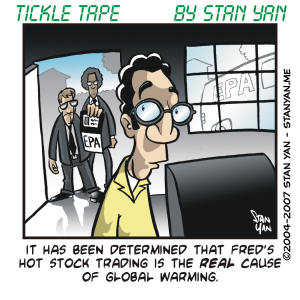In the Mark Twain classic, Tom Sawyer convinced his friends that whitewashing a fence was fun, rather than tedious, hard labour. The moral of the story: What we see as work depends on our perspective. What is work for some is play to others. In school, did you ever read a novel during vacation and see it as fun, but when it was assigned reading the following term, it wasn’t as fun to read? We naturally make a distinction between work and play, and when the same task becomes work, it becomes commonplace, and can even seem tedious and stress-provoking. Why? One reason is that we have more at stake when it is work.
If you were asked by a friend to speculate about how much consumers will spend this holiday season, for example, you might have fun making a guess. But if you were forced to decide which stocks would increase as a result of increased sales, the decision process would suddenly seem a challenge.
Some people thrive on competition. They love challenges, and when they see a chance for challenge and competition, they get psyched up. They can’t want to see how far they can go and see what they can do. Others, however, feel they are putting their self-esteem on the line when they compete. Regardless of whether you love competition or are stressed by it, you may be putting a little bit of your ego on the line with every trade. And when you do, you are likely to feel the stress. Trading isn’t fun anymore, but a challenge to your identity and well-being.
Some people are so wrapped up in trading outcomes and how it reflects on them that trade begins to reflect their value as a person; their true inner-worth. They may think consciously or unconsciously, “If I win, I’m great, omnipotent, and a champion. If I lose, I’m a sorry failure.” When you take this approach to trade, though, it can create a roller coaster ride when it comes to your self-esteem. You’ll be up one minute and down the next. In addition, the need to feel greatness can be addictive.
You may enjoy the euphoric rush of winning so much that you seek it out, even if it means taking unnecessary risks or trading impulsively. You try to see how “high” you can be, and avoid feeling down. You may over-trade just to see if you can get a rush. Soon, it seems like gambling. And if you aren’t careful, it is merely gambling.
It’s better to trade in a relaxed and carefree manner. It may be difficult to completely view trade as a leisurely activity (unless you are so wealthy that it really is just for fun), but there is a lot that you can do to make it fun. You can limit risk so that you know that you can handle a worst-case scenario. When you know that you can’t possibly lose too much, you will feel at ease. In addition, don’t put your self-esteem on the line with your money. It’s just a trade. Don’t seek out glory. Just enjoy the intellectual challenge of trading. You win some; you lose some. Take losses in stride. If you take it easy, the paradox of control will work in your favour.
In other words, when you try too hard, you are bound to crack under the pressure. But when you let the markets take you where they want you to go, ironically, you’ll feel carefree and trade more profitably. So don’t put unnecessary pressure on yourself. Slow down, enjoy what you are doing, and when you feel carefree, the profits will come your way.


